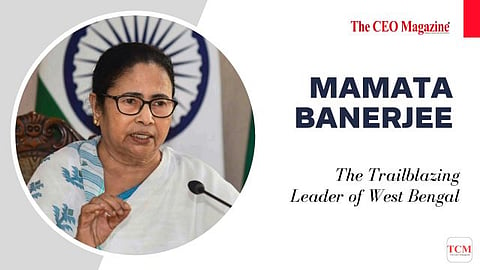
- News
- Women
- Magazine
- IndustryIndustry
- InsightsInsights
- Success Stories
- PublishPublish
- ContactContact
- Media KitMedia Kit

Mamata Banerjee
The Trailblazing Leader of West Bengal
Mamata Banerjee, born on January 5, 1955, in Calcutta (now Kolkata), is a prominent Indian politician known for her fiery spirit and remarkable political journey.
As the first woman to hold the position of Chief Minister in the state of West Bengal, Banerjee has left an indelible mark on the political landscape of India. This article will explore her life, career, achievements, and the impact she has had on the state and the nation.
Mamata Banerjee hails from a humble background in South Kolkata. Her father, Promileswar Banerjee, was a freedom fighter and her mother, Gayetri Devi, a simple homemaker.
Mamata's early life was marked by the struggles of an ordinary Indian family. She completed her education at Jogamaya Devi College and Calcutta University, graduating with a degree in law.
Banerjee's foray into politics began during her student days when she joined the Chhatra Parishad, the student wing of the Indian National Congress. She quickly rose through the ranks, becoming one of the prominent youth leaders in West Bengal.
Her true political prominence came when she joined the All India Trinamool Congress (TMC) in 1997 and soon became its General Secretary. She displayed a keen interest in social and economic issues, especially concerning the marginalised sections of society, which resonated with the masses.
Mamata Banerjee's career is marked by her dedication to land reforms and her advocacy for the rights of farmers.
Her activism and support for the Nandigram movement in 2007 played a pivotal role in challenging the Communist Party of India (Marxist) - CPI(M) government's industrialisation policies in the region. The movement ultimately led to the downfall of the CPI(M) regime in West Bengal, ending its 34-year rule.
Mamata Banerjee made history in 2011 when she became the first woman to be elected as the Chief Minister of West Bengal. Her victory was hailed as a significant political transformation in the state.
Under her leadership, West Bengal witnessed a period of rapid development and modernisation. Her government focused on various welfare schemes, education, healthcare, and infrastructure development.
Banerjee's administration also actively pursued economic reforms and industrialisation. She attracted investments and successfully organised business summits to promote West Bengal as an attractive investment destination. Her 'Didi ke Bolo' initiative, a platform for direct interaction with citizens, further enhanced her image as an approachable leader.
Mamata Banerjee's popularity extended beyond West Bengal. She worked tirelessly to expand her party's presence in other states, notably Tripura, where the TMC made significant inroads in the 2018 panchayat elections. This demonstrated her political acumen and ambition to play a broader role in Indian politics.
Throughout her career, Mamata Banerjee has received numerous awards and recognition, including the United Nations Public Service Award and the TIME 100 Most Influential People in the World.
Like any prominent leader, Mamata Banerjee has faced her share of challenges and controversies. Political opposition, allegations of corruption, and strained relations with the central government have been recurring themes in her tenure as Chief Minister.
Mamata Banerjee's journey from a simple Kolkata girl to the Chief Minister of West Bengal is an inspiring story of determination, resilience, and the ability to connect with the common people. Her impact on West Bengal and Indian politics is undeniable, and her legacy continues to shape the state's political landscape.
As Mamata Banerjee continues to lead West Bengal, her influence on the nation remains significant. Her leadership has not only transformed the state but also inspired millions, especially women, to aspire to the highest echelons of power. In many ways, she stands as a symbol of hope and change in Indian politics.
Follow us on Google News
